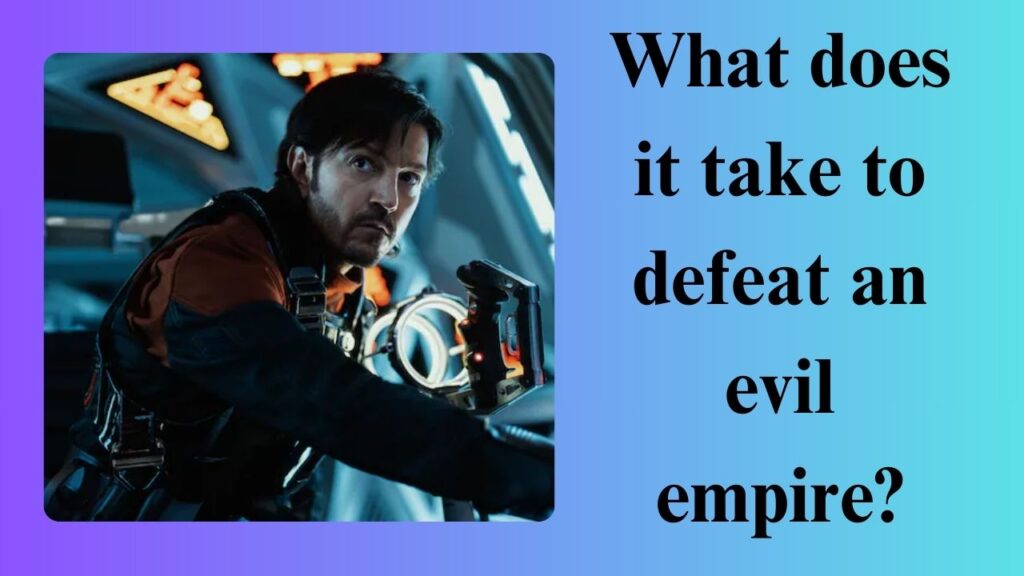What does it take to defeat an evil empire?
What does it take to defeat an evil empire?: In the vast Star Wars universe, stories of rebellion and resistance are as old as the franchise itself. But never before has the fight against tyranny been portrayed with such realism and emotional depth as in Disney+’s critically acclaimed Andor series. While previous installments have focused on lightsaber-wielding heroes and grand battles between good and evil, Andor strips away the fantasy to reveal the raw, painful, and often everyday sacrifices that make rebellion possible. It dares to ask: What does it really take to bring down an empire?
Set five years before the events of Rogue One, Andor follows Cassian Andor, a thief turned rebel spy, whose journey encapsulates the emotional and moral complexities of the fight against fascism. The series doesn’t rush into blaster fights or space dogfights. Instead, it carefully builds a world burdened by the oppression of the Galactic Empire, showing how even the smallest sparks of resistance can ignite revolutionary flames.
One of Andor‘s greatest strengths lies in its nuanced storytelling. This is not a simple story of the good versus evil. empire is not the portrayed as a distant, faceless the evil, but as a brutally efficient machine of control, surveillance, and fear. Its oppression is institutional, slow, and suffocating. Through disturbing scenes of labor camps, manipulative bureaucrats, and propaganda, the series illustrates how an evil empire maintains power not only through violence, but through everyday obedience and fear-driven silence.
In this context, Andor‘s characters stand out not for their superhuman abilities, but for their courage and humanity. Cassian, played with incredible subtlety by Diego Luna, is not a traditional hero. He is selfish at times, reticent, and deeply traumatized. But it is precisely this flawed nature that makes his eventual commitment to the Rebellion so powerful. He represents the many people who, in real-world struggles, don’t begin as freedom fighters, but are compelled to act when injustice becomes unbearable.
Then there is Luthen Rael, played by Stellan Skarsgård, a rebel leader who embodies the dark and morally gray choices that true revolution often demands. In one of the series’ most powerful monologues, Luthen confesses that he has sacrificed everything love, peace, sleep, even his soul for a dream he may never see. This moment not only defines his character but serves as a thesis for the entire series. Defeating an evil empire requires more than hope: it requires suffering, sacrifice, and a willingness to make impossible choices.
The women of Andor also play crucial roles in the rebellion, offering perspectives rarely explored in mainstream science fiction. Mon Mothma, is a senator caught between her and the political ideals and the reality of the rebellion, illustrates the risks of internal dissent. Her plot demonstrates the delicate balance between diplomacy and direct action, and how even the most privileged are not immune to the Empire’s reach. Meanwhile, Bix Caleen, Cassian’s friend and former lover, represents the physical and emotional cost of resistance on the ground. Her torture scenes are among the most disturbing in the Star Wars canon, underscoring that rebellion is not romantic: it is exhausting and often thankless.
What Andor ultimately reveals is that rebellion is not the result of a single heroic act, but of countless small acts of courage, often carried out by ordinary people. From a factory workers on the Ferrix rising up to the against stormtroopers to prisoners on Narkina 5 taking control their prison into a desperate bid for freedom, series celebrates collective action. “A way out,” they chant; Not just a call to escape, but a rallying cry for unity.
In a world where authoritarianism is not just a science fiction concept, but a pressing global concern, Andor feels urgent and relevant. It doesn’t shy away from the dark realities of resistance. It doesn’t offer easy answers or magic bullets. Instead, it presents a deep-rooted, often uncomfortable truth: to defeat an evil empire, you must be willing to sacrifice everything. Freedom, in this universe and ours, comes at a price.
By peeling back the glittering layers of the Star Wars mythos, Andor offers something deeper than mere entertainment. It’s a reflection on rebellion, resistance, and what it means to fight for a future you may never see. It teaches us that the road to justice is long, arduous, and challenging.And it’s riddled with the decisions of those who dare to rise up, even when rising up means losing everything.
In answering the question “What does it take to defeat an evil empire?”, Andor doesn’t give us a lightsaber. He gives us a mirror.




